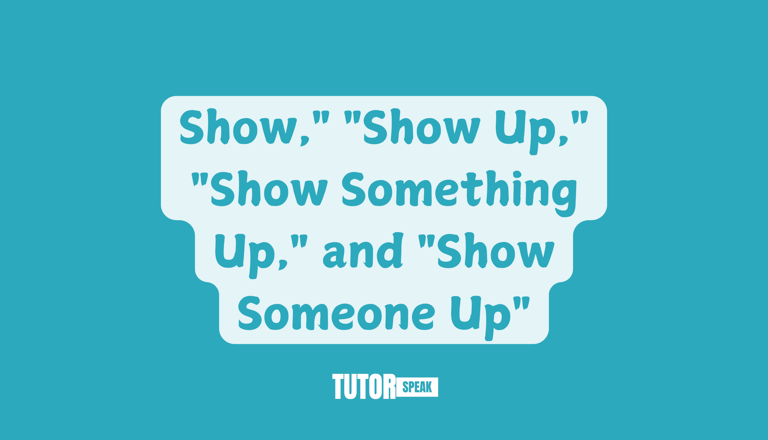Understanding the Phrasal Verbs: "Show," "Show Up," "Show Something Up," and "Show Someone Up"
Phrasal verbs like "show up," "show something up," and "show someone up" can be confusing for English learners. While they all contain the base verb "show," their meanings vary depending on the context. This article explains these expressions with examples to help you understand how to use them effectively.
TutorSpeak
12/14/20242 min read


Understanding the Phrasal Verbs: "Show," "Show Up," "Show Something Up," and "Show Someone Up"
Phrasal verbs like "show up," "show something up," and "show someone up" can be confusing for English learners. While they all contain the base verb "show," their meanings vary depending on the context. This article explains these expressions with examples to help you understand how to use them effectively.
1. Show
The verb "show" is used to mean to display, present, or demonstrate something. It is often followed by an object (what is being shown).
Examples:
Can you show me how to solve this math problem?
He showed his ID card to the security officer.
In essence, "show" involves presenting something for others to see or understand.
2. Show Up
The phrasal verb "show up" has two main meanings:
To arrive or appear at a place, especially unexpectedly or after being late.
To be noticeable or visible.
Examples:
She didn’t show up to the meeting on time. (meaning: She didn’t arrive.)
The stain on your shirt will show up in the photo. (meaning: The stain will be noticeable.)
"Show up" is often used informally to describe someone’s appearance or attendance.
3. Show Something Up
The phrase "show something up" means to make a flaw, mistake, or problem more noticeable or obvious.
Examples:
The new employee's excellent performance showed up the inefficiency of the old methods.
The bright lights showed up the scratches on the table.
This phrase highlights defects or weaknesses that might not have been apparent before.
4. Show Someone Up
The phrasal verb "show someone up" means to embarrass someone or make them look bad, especially by outshining them in some way.
Examples:
He showed his teammate up by scoring twice as many points.
Please don’t show me up in front of my colleagues—it’s unprofessional.
When used, "show someone up" often carries a negative connotation, as it suggests exposing someone’s shortcomings.
Comparing the Phrases
Show: To display or present something.
Example: "Can you show me your project?"Show Up: To arrive or appear; to become visible.
Example: "He didn’t show up for class."Show Something Up: To make a flaw or mistake noticeable.
Example: "The new system shows up the old process's weaknesses."Show Someone Up: To embarrass or outshine someone.
Example: "She showed her coworker up by finishing faster."
Exercises
1. Fill in the Blanks:
a. Please _______ me how to use this software.
b. The missing keys finally _______ in the drawer.
c. The fresh coat of paint _______ the cracks on the wall.
d. He tried to _______ me _______ in front of the manager, but it didn’t work.
2. Match the Sentence with the Correct Phrasal Verb:
a. To make a mistake more obvious.
b. To arrive late to an event.
c. To embarrass someone by performing better.
d. To display something for someone to see.
i. Show
ii. Show Up
iii. Show Something Up
iv. Show Someone Up
3. Choose the Correct Word or Phrase:
a. The bright lights _______ (show/showed up) the dirt on the windows.
b. He didn’t _______ (show/show up) to the dinner party last night.
c. Can you _______ (show up/show me) how this machine works?
d. She _______ (showed someone up/showed something up) by solving the puzzle faster.
4. Rewrite the Sentence Using the Correct Phrasal Verb:
a. He embarrassed me by pointing out my mistake in front of the team.
b. The cracks on the vase became noticeable in the sunlight.
c. The student didn’t arrive on time for the exam.
d. Can you demonstrate the solution to this problem?



